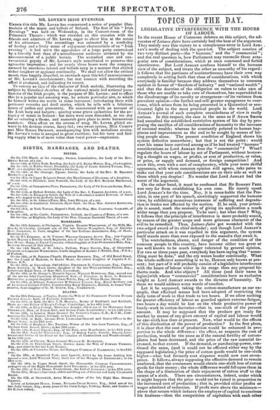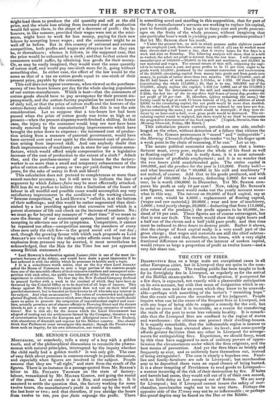TOPICS OF THE DAY.
LEGISLATIVE INTERFERENCE WITH THE HOURS OF LABOUR.
IN the recent House of Commons debates on this subject, the ad- vocates of Laissez-faire have certainly had the best of the argument. They mainly owe this victory to a conspicuous error in Lord ASH- LEY'S mode of dealing with the question. The subject consists of two very distinct parts—the " humane," and the " commercial " ; and the real question is, how Parliament may reconcile these anta- gonist sets of considerations, which at once command and forbid interference. But Lord ASHLEY confines himself to the humane view of the subject, and treats the other as unworthy of his regard: it follows that the partisans of noninterference have their own way completely in setting forth that class of considerations, with which everybody is familiar because they address themselves to common opinion in favour of "freedom of industry " and "national wealth" ; and that the doctrine of the obligation on rulers to take care of those who are unable to take care of themselves, has soperadded to the disadvantage of its novelty or strangeness—of its variance front prevalent opinion—the further and still greater repugnance to over- come, which arises from its being presented in a Quixotical or sen- timental light to the most practical people in the world. Lord ASHLEY'S avowal of such complete onesidedness of 'view is really curious. In this respect, the case is the same as if ADAM SMITH had assaulted the established restrictive system of his day by pro- posing the sacrifice of all considerations of humanity to the increase of national wealth; whereas he constantly pointed to human hap- piness and improvement as the end to be sought by means of let- ting people alone. The present condition of England shows his system defective somewhere; but that is not the point : would ever his name have survived among us if he bad treated " humane" considerations as Lord ASHLEY does the " commercial" ? What! regulate the hours of labour by act of Parliament, without bestow- ing a thought on wages, or profits, or cost of production, or value, or price, or supply and demand, or foreign competition ! And avow this, even with a sort of complacency, while your more skilful opponents, with whom common opinion still agrees, take pains to make out that your sole considerations are on their side as well as those which you despise ! No wonder that Lord ASHLEY had the worst of the argument. On the other hand, it must be confessed that Sir ROBERT PEEL was very far from establishing his own case. He merely upset- Lord ASHLEY'S for the time. Nay, it is remarkable that the Pre- mier, in one part of his speech, unwittingly supported the humane view, by exhibiting monstrous instances of suffering and degrada- tion in trades not affected by the motion. If, he said, your princi- ple is sound, mark the necessity of giving its application a much wider range than you propose. To be sure; but what then ? Why, it follows that the principle of interference is more probably sound, by reason of the greater scope and more grievous character of the evil to be remedied. Thus, Laissez-faire got wounded with the two-edged sword of its chief defender ; and though Lord ASHLEY'S particular attack on it was repelled in this argument, the system itself stands more than ever exposed to the assaults that await it.
The wretchedness, shame, and danger of the condition of the common people in this country, have become either too great or too well known to be much longer tolerated by general opinion.
For two or three years past, everybody has been saying that "some- thing must be done," and the cry waxes louder continually. What the whole-sufficient something is to be, Heaven only knows at pre- sent ; but part of it will probably consist of a legislative interference with the hours of labour wider in its range than any proposal hi- therto made. And who' objects ? All those (and their name is legion)with whom "commercial" considerations have as exclusive weight as Lord ASHLEY awards to the dictates of humanity. To these we would address some words of comfort.
Let it be supposed, taking the cotton-manufacture as our ex- ample, that effectual means bad been adopted of restricting the daily term of work in that trade to ten hours. If we allow nothing for greater efficiency of labour so guarded against extreme fatigue,
two hours a day would be lost on the whole productive power of handy-work in cotton-factories—that is, one-sixth of the present amount. It may be supposed that the produce got ready for market by means of any given amount of capital and labour would be one-sixth less than at present. Now, what would be the effects of this diminution of the power of production ? In the first place, it is clear that the cost of production would be enhanced in pro- portion to the whole difference : the effect, as respects the cost of production, would be the same as if the natural fertility of cotton- plants had been decreased, and the price of the raw material in- creased, to that extent. If the demand, or purchasing-power, con- tinued the same, (and it could not be affected either way by the supposed legislation,) the price of cotton goods would be one-sixth higher—what had formerly cost sixpence would now cost seven- pence. It follows, always supposing the effective demand to remain unaltered, that the consumers would obtain one-sixth less of cotton goods for their money ; the whole difference would fall upon them in the shape of a diminution of their enjoyment of cotton stuff to the extent of a sixth. There are circumstances, indeed, under which it might happen that the price would not be raised in proportion to the increased cost of production ; that is, provided either profits or wages admitted of reduction. If profit were above the minimum— above that return which induces the employer of capital to continue his business—then the competition of capitalists with each other
Might lead them to produce the old quantity and sell at the old price, and the whole loss arising from increased cost of production would fall upon them, in the shape of a decrease of profit : the la- bourers, in like manner, provided their wages were not at the mini- mum, might have to work for less money, paying for their new leisure by accepting lower wages ; and the consumer might be as well off as before. But in this country of universal and extreme competition, both profits and wages are always as low as they can be, or thereabouts ; whence it follows, in the supposed case, that the price would be enhanced by a sixth • and that to that extent the consumers would suffer, by obtaining less goods for their money. Or, as may be easily imagined, they would want the same quantity of cotton stuff, and would pay one-sixth more for it, going without something else. In either case, the effect of the law would be the same as that of a tax on cotton goods equal to one-sixth of their present price, payable by the consumer. This evil does not appear enormous, when viewed as the purchase- money of two hours leisure per day for the whole slaving population of our cotton-manufacture. Which is best—that the consumers of cotton goods should have to pay sevenpence for their present six- pennyworth, and the cotton-factory population be saved two hours of daily toil, or that the price of cotton stuffs and the horrors of the cotton-factory should remain unaltered ? But this is not the sole consideration. Let us suppose that a ten-hours law had been passed when the price of cotton goods was twice as high as at present—when the present sixpennyworth fetched a shilling. In that case, the injury to the consumer would long ere now have been totally removed by the manufacturing improvements which have brought the price down to sixpence : the increased cost of produc- tion arising from a measure of paternal government, would have been covered over and over again by the decreased cost of produc- tion arising from improved skill. And can anybody doubt that fresh improvements of machinery are in store for our cotton-manu- facture, which would afford ample compensation for a legislative increase of the cost of production to the extent of a sixth ? Admit that, and the purchase-money of some leisure for the factory- worker is no more than a small and temporary enhancement of the price of cotton stuffs—a penny or two per yard during two or three years for the sake of mercy to flesh and blood !
This calculation does not pretend to completeness or more than round-number accuracy ; but it will serve to indicate the line of argument by which Laissez-faire may be most effectually attacked. .Still less do we profess to believe that a limitation of the hours of labour in all needful and possible cases would accomplish any very satisfactory improvement in the condition of the working classes. -"Intense competition," as Lord Ilowlex* called it, is at the bottom of their sufferings; and this would be rather augmented than dimi- nished by a law providing against that excessive toil which is a potent shortener of life and check on the increase of numbers. No ; we must go far beyond any measure of " short time" if we mean to -cure the disease of our economical system, instead of merely at- tempting to alleviate one of its symptoms. Competition, it cannot be repeated too often—competition among the members of every -class save only the rich few —is the grand social evil of our day ; and, though the growing favour with which such proposals as Lord AsaLav's are viewed by the ruling order affords some hope that an -explosion from pressure may be averted, it must nevertheless be acknowledged, that the Man for the Time has not yet appeared among British statesmen.
" Lord HOWICE'S declaration against Laissez-faire is one of the most im- portant features of the debate, and would have made a great impression if he had enforced it with the ability which he possesses to handle such a topic. t It is a coincidence worth notice, that on the day when Lord ASHLEY asked the House of Commons to save a large portion of the common people from one of the miserable effects of their excessive numbers and consequent com- petition with each other, the public was informed of the failure of an important experiment in colonization. On that day the New Zealand Company declined to proceed further with a work in the conduct of which they have been so thwarted by the Colonial Office as to be deprived of all hope of success. This charge against Mr. STEPHEN'S department does not rest on their brief and guarded statement, but is founded on facts known to all who take any interest in the subject. And what an accusation ! The rulers of overcrowded and capital- glutted England, the Government which more than any other in the world should spare no pains to promote the emigration of superabundant capitol and num- bers, actually permits a set of obscure officials in Downing Street and the distant islands to put a stop to the most promising colonizing enterprise of modern times! Nor is this all; for the means which the Local Government has adopted of rooting out the settlements formed by the Company, threaten a war of extermination between the European and Aboriginal races of New Zealand, with abundance of discredit and expense for the Mother-country. One should think that Parliament must investigate this matter ; though the Premier may deem such an inquiry, for his own information, not worth the trouble.



























 Previous page
Previous page